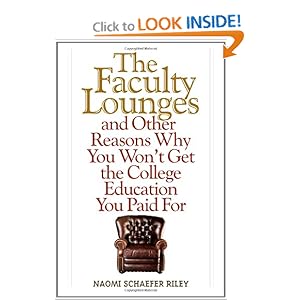
In “The Economic Upside to Ending Tenure” (Chronicle of Higher Education, June 19, 2011), Naomi Schaefer Riley goes beyond the usual complaints about tenured lecture room mediocrities to say,
Tenure means not having to worry about having to find new employment in middle age, and that means a lot to professors. As the George Mason University economist Tyler Cowen explains, “In a lot of academia, once you’re over 50 it’s hard to get another job, even if you’ve done well.” He compares it to being a computer programmer, where age seems to be a disadvantage no matter how talented you are. Taking an academic job without the promise of tenure is what Cowen calls “a massive risk.” So there would have to be a lot of money on the front end to make up for it.
In the long term, though, the costs might even out. Higher education would have a more sensible-looking labor market, in which colleges could ensure that all the faculty members were pulling their weight. This is particularly important for small colleges, says Bruce Johnstone, who has served as president of Buffalo State College and a vice president at the University of Pennsylvania. Large universities, in his experience, “tend to have ways of cushioning the existing departmental configurations a bit better than community colleges or small private colleges.” Johnstone, who has also been a trustee at a small, independent college, says smaller institutions “need to add and subtract programs much faster and therefore need to be freer of the constraints of tenure.”
Interesting comparison:
d Larson, a Pulitzer Prize-winning professor of history at Pepperdine University, who served as associate counsel for the House of Representatives Committee on Education and Labor, compares higher education to baseball. Getting rid of tenure, he says, is akin to introducing free agency into the major leagues. It brought a lot more flexibility to team managers and players, but it also made things much more expensive. Free agency in baseball came about when the reserve clause—which tied a player to a particular team even after his contract had been fulfilled—was thrown out by an arbitrator. Interestingly, the reserve clause, which smacks of academic tenure, was opposed by the players, who thought they could get a better deal as free agents. The “players” in academia haven’t yet come around to that view of tenure.
Riley is the author of Faculty Lounges: and Other Reasons Why You Won’t Get the College Education You Paid For (Ivan R. Dee)
It’s historically interesting that tenure originated to protect unorthodox opinion. Some say that one cannot have both rostrum-for-life and intellectual freedom, so no surprise that the university has become one of the least free environments in s typical constitutional democracy. (See Foundation for Individual Rights in Education (FIRE)).